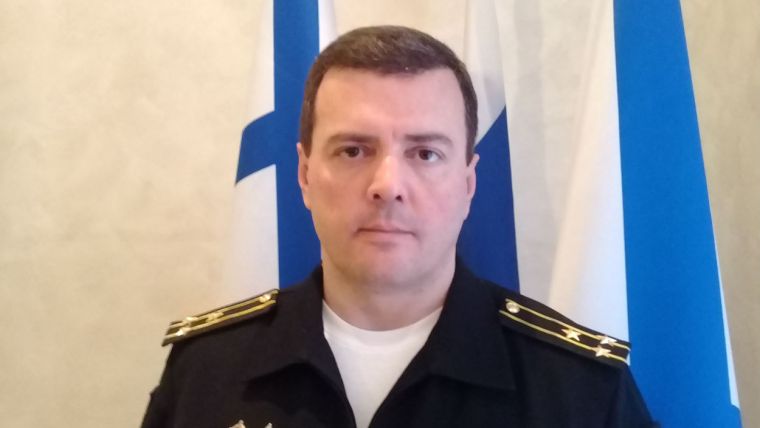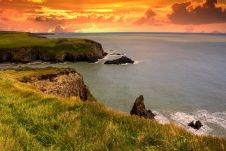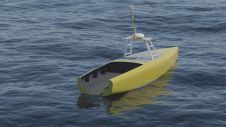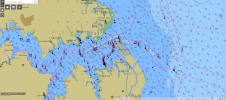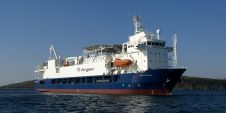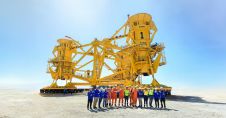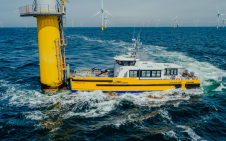5 Questions to Sergey Travin
First IHO Assembly to Elect Secretary-General and Directors
During the first IHO Assembly taking place from 24 to 28 April 2017 in Monaco, the represented Member States will elect the new Secretary-General and Directors. The nominees present themselves by answering the same 5 questions. This multi-interview is available at www.hydro-international.com/iho-2017. Captain 1st Rank Sergey Travin, (Russian Federation), nominated for Director, answers 5 questions.
Some coastal states are not yet members of the IHO. How do you envisage improving the number of the IHO Member States?
Work on the attraction of new members to the IHO is well organised, and we can see real results. I cannot fail to mention here the excellent work of the current Secretariat of the IHO. I am sure that it is necessary to maintain the tried and tested work methods, in other words to explain the advantages of the IHO to its potential members through the mass media, personal technical visits, and the active promotion of the IHO achievements at all levels. One should be active through specialised publications, including those of organisations involved in maritime activities (IMO, IOC UNESCO, FAO, etc.).
Hydrographic services often do not have the opportunity to explain the necessity and importance of their work, and the benefits it can bring, to the country authorities. Therefore, contact with the governments of these countries and work through diplomatic channels is very important.
One of the main objectives of the IHO has, for a number of years, been to foster the hydrographic capabilities of developing countries. How do you envisage continuing and possibly improving the IHO’s actions in this field?
I see prospects in establishing cooperation with developing countries in the form of improvement of the professional level of specialists, training of personnel from developing countries during joint work and hydrographic surveys, in strengthening the technical capacity of these countries through cooperation agreements and the supply of equipment.
A major goal of the IHO for improving the work in this field, from my point of view, must be a systematic and consistent increase of scope of the participation of representatives of developing countries in the IHO commissions and committees, which will help them with their more rapid integration.
But fostering the hydrographic capabilities in this case may turn out to be only part of the solution for complex problems. For example, the problem of piracy interferes with the growth of developing economies, stops trade activities, and destroys the reputation of states. The member countries of the IHO, as you know, already have the ability and experience to effectively fight piracy. Cooperation with the IHO will enable developing countries to improve their economies in general, and this will give them the opportunity to create their own hydrographic basis.
IHO has established Memorandums of Understanding (MOU) with several other Organisations, Associations and Institutions. In particular, the IHO is a permanent observer of the UNO Assembly. In which way will you coordinate the relations with those entities in order to obtain support in meeting the IHO objectives?
The work of the IHO with international organisations is a long-standing and well-established process. First of all, I support a dynamic and active exchange of information and experience at the level of experts. Representatives of the IHO and international organisations should be constantly aware of the real situation regarding all cooperation issues in the field of hydrography. Of course, it will take some time to study practical work in this area. As the director of the Department of Navigation and Oceanography, I have experience in working with international organisations such as IOC UNESCO, IMO and WMO. We participate in major projects, for example, together with IOC UNESCO, we are working on the development of natural disaster warning systems, including the extremely important early warning system for tsunamis. So, here I have an opportunity to use my existing experience for solving specific tasks of the IHO.
The private industry (PI) participates in oceanographic, hydrographic and cartographic activities with surveys, instruments and software for data analysis and electronic charts production. How would you deal with the PI to optimise its contribution to the IHO?
The IHO is an excellent platform for using capabilities and expanding the market of private companies, and the organisation actively uses their support and resources in its work. To attract investors, IHO needs to be well-known to the public. Therefore, it is important to popularise the IHO and improve its influence through work at the level of governments and active media coverage. Responding to the needs of investors this way, the IHO will be able to attract new funds for our international projects.
Hydrographic data are managed, by the IHO, in a Marine Spatial Data Infrastructure. How do you see their use by the general public beyond their use for ENCs?
Electronic navigation charts are just one of the layers of the infrastructure. The database, which fills this infrastructure, can be used for the creation of models for a wide range of tasks, in addition to ensuring the safety of navigation. It can include work such as dredging, pipeline laying, search for sunken objects, continental shelf surveys, oil and gas exploration. As an example, I can mention the use of bathymetric data in the interests of the fishing industry in search for shallow places that attract fish. Our department has experience in such work. I think that the scope of infrastructure implementation will expand in the conditions of modern development of science and technology.
Sergey Travin graduated from the Naval Academy in Saint Petersburg in 1994. He started his career as a naval hydrographer, had several administrative appointments on shore connected with hydrographic support of the Navy and he is currently the director of the Department of Navigation and Oceanography of the Ministry of Defence of the Russian Federation.

Value staying current with hydrography?
Stay on the map with our expertly curated newsletters.
We provide educational insights, industry updates, and inspiring stories from the world of hydrography to help you learn, grow, and navigate your field with confidence. Don't miss out - subscribe today and ensure you're always informed, educated, and inspired by the latest in hydrographic technology and research.
Choose your newsletter(s)
